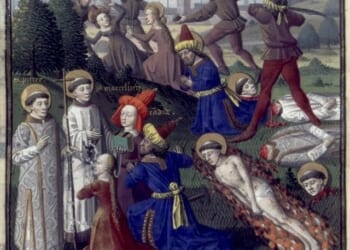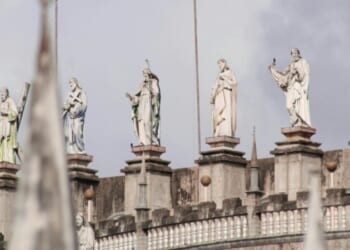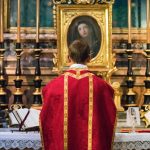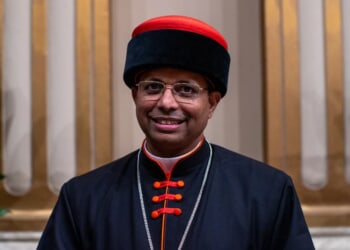Thomas Merton spent his life contemplating his purpose in the world, trying to discern how his desires and ambitions fit God’s plan. Born in France in 1915, Merton was, by his own admission, wild as a youth before he converted to Catholicism and decided to join a religious order. Initially, he sought to join the Franciscans, but after being denied, he ended up with the Trappists, living most of his life, from 1941 until just before his death in 1968, at the Abby of Gethsemani in Kentucky.
Besides his role and work as a monk, Merton’s true profession was as a writer. He wrote numerous books, the most famous being The Seven Storey Mountain, published in 1948. Most of his books were about his own spiritual journey, and he became quite famous, though he felt guilty for his fame. He was a true recluse, seeking most days to be alone with God. He kept a daily journal in which he reflected on his life and relationship with God.
Merton worked to fulfill the Great Commission in three ways: first, as a monk in daily prayer for others; second, through his books and articles, in which he reached out to religious and nonreligious trying to strengthen the faith of the former and turn the latter toward God. Third, and most unique, was his work to bring the Great Commission to creation. This is, after all, what Jesus commanded, according to the Gospel of Mark: “Go into all the world and preach the gospel to the whole creation.” Unlike Matthew, who writes that Jesus proclaimed that His disciples “go and make disciples of all nations,” Mark uses the Greek word ktisis, which literally means “creature” or “creation.” How does one preach to all creatures, to the whole of creation?
Preaching to creation was what Thomas Merton did. One of the ways he did so was by recognizing the Logos in individual creatures in God’s creation. The Logos, the Word, is, according to the Gospel of John, the creative presence with God at the beginning—“through Him all things were made,” John writes. The meaning and significance of such an idea is far beyond what humans can understand.
Merton knew his own limitations, but he also had a discerning mind and a love for all creatures. He spent days and nights, usually alone, in the forests and meadows of the Abby at Gethsemani, where he watched the sun and moon, felt the breeze, the cold of winter and heat of summer, focused on the many animals that lived nearby, watching the moment of all things—birth, growth, and death. He was a child of wonder in his investigations of the natural world.
This empathy he felt toward all things was the gift he possessed to fulfill Christ’s commission to bring the Good News to other members of creation. The missionary must gain awareness of the Logos as the creative presence in all things, and by this awareness the missionary spreads the Good News.
Merton’s path to fulfilling the Great Commission was his recognition that Love is all. Love is the creative act, the way that God communicates with all aspects of and all individuals within reality—which he referred to as “the reality of now—the unreality of all the rest.” He goes on to write:
The unreality of ideas and explanations and formulas. I am. The unreality of the rest. . . . Butterflies dance together . . . The trees are fresh and green in the sun . . . Small clouds inexpressibly beautiful and silent and eloquent over the silent woodlands. What a celebration of light, quietness, and glory!
The simplest acts of life and death in God’s creation became to Merton eloquent testaments to God’s love, the presence of the Logos, the ultimate expression of God’s truth. “Today it was wonderful,” he wrote. “Clouds, sky overcast, but tall streamers of sunlight coming down in a fan over the bare hills. Suddenly I became aware of great excitement.” Starlings rose from the meadow in great numbers, startled by a predator soaring high above. A hawk attacked and grabbed one of the birds in its talons. Merton, knowing he was witnessing one of the great wonders in nature, turned to God in prayer, but he was distracted by the hawk ripping into the captured starling, gorging itself in a bloody repast. He realized the hawk’s important role in the nature of all things, saying to the bird, “I wonder if my admiration for you gives me an affinity for you, artist. I wonder if there will ever be something connatural between us, between your flight and my heart, stirred in hiding to serve Christ as you, soldier, serve your nature.” Merton realized that the hawk by his actions praised God, doing what he was meant to do.
The many animals Merton saw that day, he realized, “sanctified” God by their actions. An amateur birder, Merton observed a Tennessee warbler and “felt very close to God or felt religious awe anyway. Watching those birds was as food for meditation or as mystical reading. Perhaps better. Also the beautiful, unidentified red flower or fruit I found on a bud yesterday. I found a bird in the woods yesterday on the feast of St. Francis. Those things say so much more than words.” What a gift, he thought to himself, that God had given him in allowing his senses and mind to be completely entranced by these natural wonders.
What was more, Merton felt a great anonymity in watching birds that were themselves anonymous, without names, yet each one known, and cared for, by God. Such, he believed, was the role of the missionary, to bring knowledge of God to others, if only by observing them, caring for them, understanding them, loving them, then to move on, to depart, to become as anonymous as the creatures he witnessed.
There was something holy in the night to Thomas Merton. Many evenings into the night, or awakening early, long before dawn, he sat alone and felt and watched the symphony being playing before him: the dampness of the cool night air, the rising fog, the path of the moon, the crickets singing a mystical song, the early morning birds marking their territory or singing out for a mate, the silence of the snowfall or the drama of the thunderstorm—all wondrous, all musical, all magisterial, songs of life, of creation, of which he was a part, merged with all creatures, all things made by God. He could feel the presence of the Logos, and he knew that God was with him.
In such a way Thomas Merton united himself with the thousands of missionaries who came before him—Spanish, French, German, English, Polish, and more—who crossed the Atlantic to the Americas in the 1500s, 1600s, 1700s, 1800s, bringing the Good News to fulfill the Great Commission. They mostly came to other humans, to the Native Americans of South, Central, and North America, but they came also to all creatures, all creation, bringing their thoughts and minds, their senses and awareness to the beauty of the American world. Seeking to understand its environment, to live in it, suffer in it, die in it, these missionaries brought their whole being to spread the Word to all things in all of America.
Thus, Roman Catholicism imprinted itself on the New World and its people. It was truly catholic, truly universal, this spiritual presence that spread throughout the land.
Author’s Note: This article concludes our series on North American Missionaries and the Great Commission. All other articles may be found here.
All quotes for this article were taken from Thomas Merton, The Intimate Merton: His Life from His Journals (New York: HarperCollins, 1999).
Photo by Sibylle Akers on Thomas Merton Center

















